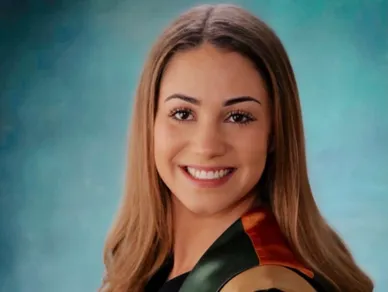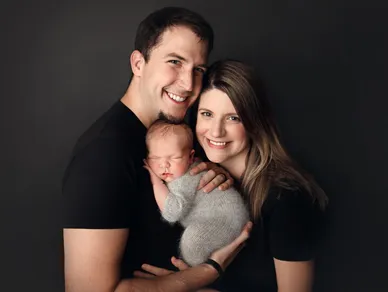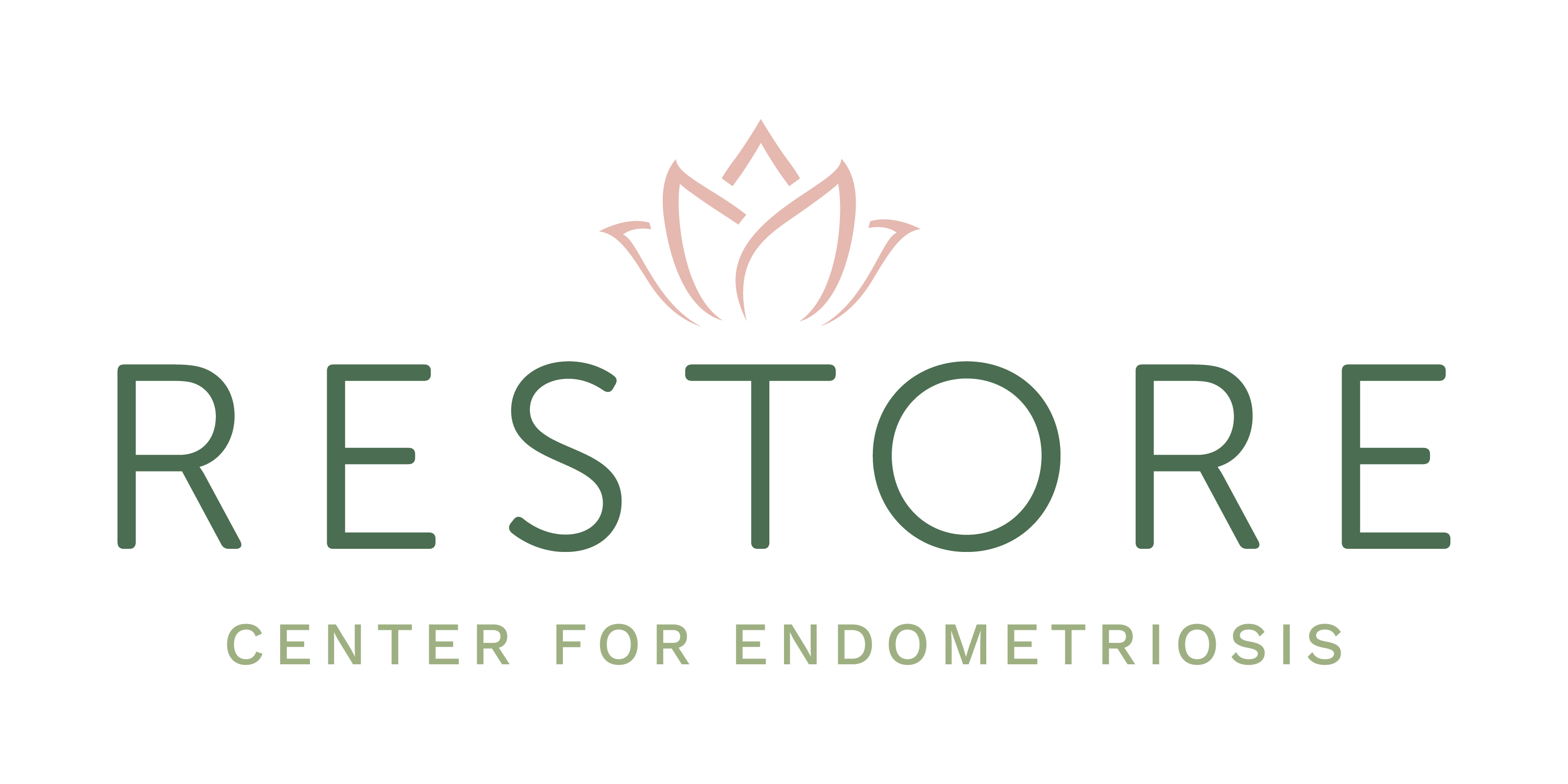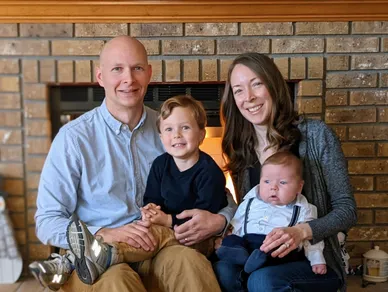9 min read
Saved My Life by Lauren Rogerson
Restore Center For Endometriosis Apr 23, 2024 1:58:33 PM

My name is Lauren, and I am from Canada's smallest province, Prince Edward Island. I am now 22 and healthy, but that wasn't always the case. By the grace of God, I found Dr. Yeung, and it is thanks to him I am writing my testimony today. Although my story is a little different, I hope it resonates with you and helps you feel validated, hopeful, and less alone.
My first period began when I was 12 years old, yet nothing abnormal stood out until I was about 14. It was then that the days leading up to my menstrual cycle were filled with extreme nausea and bloating, turning into a 7-9 day long period with cramps that would leave me doubled over in excruciating pain. While my periods were worse than some of my friends', I was told this bedridden pain and the debilitating PMS symptoms were normal. My doctor prescribed me Naproxen as a painkiller, and I went along with this "female normality" mindset until I was about 15 and began experiencing a bizarre set of symptoms....
The first time this cluster of symptoms came around, "it" (as my family and I used to call it) only lasted a few days. Since it was short-lived, we didn't think much of it at first, perhaps a strange virus. The symptoms included the following: Extreme fatigue and weakness to the point I could barely walk up a flight of stairs, hold my arms over my head, or get out of bed. Bloating so severe I couldn't wear any of my regular clothing, a pale/graying face and lips, and "brain fog." This brain fog feeling made me unable to think clearly, communicate effectively, or concentrate on studying school material. I was also nauseous and suffered from constipation, painful bowel movements, and an aching pain that radiated through my pelvic region, upper thighs, and lower back. Furthermore, I experienced a constant throbbing dull ache over my lower right abdomen.
During my period, there were many times where I could not insert tampons, almost as if my body was rejecting them. Occasionally I would also experience out-of-body sensations or a dream-like reality, and at night I would have dreams so vivid, I would have to ask others if these events happened or not. All in all, it felt like my personality had been sucked out, turning me into a zombie-like form of myself. I remember looking in the mirror and not even recognizing the person staring back at me.
It was absolutely terrifying.
Six months after this first episode, "it" returned, lasting a whole week. A few months later, I had another episode lasting two weeks long. It was challenging to make sense of the symptoms as they were not coinciding with a specific phase of my menstrual cycle or with what I ate. Furthermore, there seemed to be no rhyme or reason to the good days versus the bad, and nothing was appearing abnormal in my bloodwork.
In October of my grade 11 year, "it" came and did not leave. Here began two years of doctor visits, trips to the emergency room, and the realization that this was not a simple fix. I first tried to explain my symptoms to my pediatrician, who told me in under five minutes that I wasn't taking care of myself; I was "a typical teenager who was spending too much time on my phone and not getting enough sleep" or perhaps I was
just too stressed out. These words will stick with me forever. I wasn't stressed, I did well in school, took extracurricular dance and music lessons, ate well, and had no problem sleeping. I was hurt and angry for not being heard and being completely misunderstood.
It was as if my character was being questioned, like what I was experiencing was typical or worse; it was all in my head. Little did I know this was only the beginning of my fight.
After countless doctor (medical and naturopathic) appointments, emergency room visits and tests, my diagnostic list was growing: chronic constipation, acid reflux, gallbladder, food allergies, and IBS. I was getting frustrated as the symptoms were not improving, no matter my dietary changes. Then we began to wonder, were these symptoms gastrointestinal or more gynecological? Finally, after begging doctors to go down this road, an ultrasound was ordered, revealing a 5cm ovarian cyst on my right ovary, precisely where the dull ache was stemming from! At first, I was elated; the cause had been found! My mom heard of an excellent local acupuncturist who treated ovarian cysts, so I immediately booked an appointment. About 24 hours after the treatment, I felt an intense pain over my right ovary for about 10 minutes and then the dull ache was gone. Even the rest of my symptoms had subsided, and I was feeling the best I had in months!
My follow-up ultrasound revealed the cyst had indeed burst/shrunk, but unfortunately, my relief did not last long, and the bizarre symptoms returned. However, with this revelation of ovarian cysts and the temporary relief, my doctors now believed this was a gynecological issue, and I was put on birth control as an attempt to mask the symptoms. I also continued with acupuncture appointments for my recurrent ovarian cysts and flare-ups, as this treatment proved extremely helpful for my symptoms.
For a few months, oral contraceptives (OCTs) and acupuncture helped make the symptoms manageable. I was getting along ok, but soon "it" was back in full force. For the following year, I sought out second opinions from other gynecologists and was put on different OCTs to try to diminish the symptoms. It seemed a pill would work for a few months, and then my body would stop responding to it. During this time, no investigation was done, and no explanation was given as to why these symptoms persisted. No one had any answers for me.
In January of grade 12, right in the middle of my final exams, I had a severe bout of my usual symptoms that turned into an emergency appendectomy. My family and I got our hopes up again, and we were so optimistic this was the cause of my symptoms all along; a chronically inflamed appendix!! After all, the problem area seemed to be my lower right abdomen. One month later, the symptoms reappeared. I was devastated.
Something was severely wrong with me, but no one could find out what. We were back to square one, and I was terrified.
My symptoms were getting worse. I was missing so much school, and I was trying to teach myself in order to keep up. I was missing my dance and music classes, and of course, any social life was nonexistent. The symptoms often overpowered me, leaving me unable to do much other than lay in bed. I lost most of my friends, as no one understood. My quality of life was so poor, and I remember some days when I would be so discouraged that I felt there was no hope. I was also terrified of what was happening to my body, whether I would face fertility issues or if irreversible damage was occurring.
I can picture myself yet, with no life in my body, slowly trying to carry on. I'd be using a heating pack to help the cramps, wearing baggy clothes to fit over my bloated abdomen, and carrying a bottle of ginger ale for nausea. In fact, I used my heating pack so often that I broke the microwave and still have scars on my abdomen from burning myself.
There were even days I would look at my reflection, see the sick person looking back at me, and find myself rocking back and forth on the bathroom floor in a puddle of tears.
The upcoming fall, I was set to begin university in my hometown. The idea of going away for college was not even on my radar due to my health. As my symptoms continued to worsen, my mother continued to advocate for me and wrote up a case study of my medical history and symptoms in desperation. She sent this to my aunt's sister-in-law, an OBGYN in the United States, hoping she would circulate it among her colleagues and that it would resonate with someone. Almost immediately, she emailed us back asking if I had been screened for endometriosis. We began reading and trying to learn everything we could about endometriosis, including watching YouTube videos of people's endo stories. Immediately, the symptoms and stories began to resonate like alarm bells. We had asked whether this may be a possibility in the past, but we were always dismissed by doctors when mentioning it. After educating ourselves about the condition, we brought it up again. Still, we were told that a diagnosis required surgery, and even with an endo diagnosis, there was no cure or effective treatment here.
I understand better now that being denied a diagnostic operation was partly due to my young age and possible risks. However, the most upsetting part was that my symptoms were still being dismissed and belittled. My quality of life was feeling neglected, and that hurt the most. The other unfortunate piece to my story was that even if I was diagnosed with endometriosis, the primary treatment in my location was still birth control pills or surgical ablation.
Although no one was willing to investigate for endometriosis, I was still prescribed a medication called 'Visanne' to help with symptoms of endometriosis. Again, it did not help, and in fact, I was getting worse. My first semester of college was not going well. I had to be driven every day as I was not safe to drive myself, and I was getting weaker each day. The brain fog made studying a challenge, and I constantly needed my heating pad for the pain. The good days were rare now, and I simply could not function. Both my physical and mental health was suffering. I was supposed to be living the life of a college freshman, but instead, I needed my mom to blowdry my hair because I was too weak to do so. My life was on hold, and while this was hard to accept, I kept hoping for a miracle.
Reality hit hard one day, and we knew we had reached the end of our resources here, and my mom had had enough. She again reached out to my aunt's sister-in-law (the OBGYN who had suspected endo) and asked her what she would do if she were in our situation. Without hesitation, she recommended going to St.Louis, Missouri to see
Dr. Yeung, an OBGYN who specializes in endometriosis.
My mom wasted no time and contacted Dr. Yeung to find out how a Canadian could get an appointment for a consultation and possible surgery. Dr. Yeung's team was amazing from the first phone call explaining everything we needed to know and do.
They worked around my school schedule and accommodated our travel schedule. We felt confident we were doing the right thing even though it was a massive leap of faith.
Of course, I was nervous at first, though. This was a big step to take, but I had been misdiagnosed and misled so many times, and I had reached the end of my possible resources. My quality of life was worth this leap of faith.
In December, two years and two months after the symptoms came and persisted,
I met with Dr. Yeung for a consultation. This was when my prayers were answered. The first thing I remember about Dr. Yeung is how he took the time to listen to me and validate what I was experiencing. I had spent years having my story dismissed, not being believed by health care professionals, and told there was nothing wrong with me.
Finally, here was someone who was willing to help me.
On the day of the surgery, my mom and I were terrified. What if he doesn't find anything? Or what if he does, and there is extensive damage that will affect my fertility someday? Dr. Yeung assured us he would do everything in his power and to treat me as if I was his own. He even took the time to pray with us before taking me to the OR. My first memory is waking up in the recovery room and asking the nurse, "Did he find something? Was there something there?" to which she replied, "Yes, sweetheart, he did!
He found it and fixed it!" I let the tears stream down my face thanking her over and over.
As explained to us after surgery, he had removed inflamed tissue and biopsied it for endometriosis and dealt with a deep retraction pocket around my right ovary. We wouldn't know for sure if there was any endometriosis until the biopsy results returned, but he felt my symptoms could also be from the deep retraction pocket (DRP). Shortly after returning to Canada, Dr. Yeung was happy to report that the biopsies were negative, and if I was symptom-free, it was most certainly from the DRP. He also explained this is sometimes referred to as Allen Masters Syndrome (a sister condition to endo).
I just celebrated my four-year anniversary of being symptom-free, all thanks to Dr. Yeung and his amazing team! I have completed my undergraduate degree in Science with a double major in Biology and Psychology, and I now know my passion. I
hope to pursue a career in medicine and work in women's health, assisting others in similar situations. In the meantime, I am working on advocacy projects back in my province and trying to bring more awareness to these conditions and women's health inequalities. While I am thrilled to help others now, it did take a while to get to this point.
For years, I couldn't tell my story without getting upset or having a panic attack. While my physical body had healed, my mind had not. I was worried my symptoms would come back, and things my brain had associated with being sick became triggers. I was avoiding people, events, activities, etc. Dr. Yeung had healed me physically, but mentally I needed help.
At first, I thought I could deal with the trauma of this experience on my own, but I hit a tipping point that made me realize I needed professional help. When I saw a specialist for a heart/lung issue that surfaced with my Allen Masters Syndrome, I was again dismissed, not properly listened to, and did not feel validated. I was made to think there was nothing wrong with me, and I was just wasting the doctor's time. These triggers hit, and I left the room in time to make it to the nearest bathroom, where I stayed sobbing and panicking for over an hour until I could compose myself to drive home. I then accepted the fact that there was mental trauma I needed to work through from this medical experience.
I sought help from a PTSD/Trauma psychologist, and after six months of doing Eye Movement Desensitization and Reprocessing (EMDR) therapy, I am no longer negatively affected by the trauma of this journey. I learned I needed to validate not only the physical damage done but also the emotional trauma this inflicted. I had been dismissed and belittled for years, living in constant fear of what was happening to my body. The uncertainty of my well-being leading up to meeting Dr. Yeung had just continued to build up, layer upon layer. I learned I needed to help myself before I could help others, and now here I am, writing my story, hoping to empower others in similar situations.
For those reading and possibly relating to this story, don't give up. Know that what you are experiencing is real and not in your head. Continue to advocate for yourself both physically and mentally. Not a day goes by that I am not grateful for what
Dr. Yeung and his team have done for me. I truly believe I would never have been helped if God had not led me to Dr. Yeung. He saved my life, and I will forever be grateful for him, his team, and my incredible psychologist who has allowed this story to be told.
Browse Topics
Related Posts

No More Endo by Catherine Fulford



